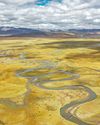The hot spring hotspots of Japan, Taiwan and Korea shed light on this classic way to relax

The hot tears of dragons who have crawled into caves beneath the earth seep through cracks in the rock. A beautiful Japanese woman whose husband has betrayed her boils the water with her jealous rage. The spilt blood of Indian warriors angers the mountain, and she protests with searing jets. Every hot spring has its story.
The geological explanation of what’s happening is no less impressive. Hot springs occur naturally when geo thermally heated water rises through a fault in the Earth’s crust. They are found predominantly in active volcanic zones, where magma has heated the groundwater enough to build up pressure beneath the surface. Sometimes hot springs erupt with a super heated jet of steam known as a geyser; in other places the temperature has cooled sufficiently by the time the water breaks through the rock and it materialises as a pool.
Many ancient societies had little or no comprehension that the Earth’s core was as hot as the surface of the Sun. Instead, they used miracles and dragons to explain the hot spring phenomenon. People were drawn to the pools to bathe and to pray, because they believed the mineral-rich – perhaps even sacred – water might heal their aches and pains.
Taiwan’s Beitou Hot Spring Museum contains a brief history of hot springs. Built as a public bathhouse between 1911 and 1913, it was once the largest public bathhouse in East Asia. Inside its impressive red brick Victorian exterior (a Class 3 Historical Site) are airy wooden galleries, balconies, and a vast communal bath lined with arched colonnades.
This story is from the {{IssueName}} edition of {{MagazineName}}.
Start your 7-day Magzter GOLD free trial to access thousands of curated premium stories, and 9,000+ magazines and newspapers.
Already a subscriber ? Sign In
This story is from the {{IssueName}} edition of {{MagazineName}}.
Start your 7-day Magzter GOLD free trial to access thousands of curated premium stories, and 9,000+ magazines and newspapers.
Already a subscriber? Sign In

A Spectrum Of Scarlet: The Symbolic Red Of Asian Flags
A common thread that unites many Asian flags is the prominent use of red, a colour rich with symbolism

Curry: A World of Flavour, Tradition, and Culture
From its humble beginnings in India, the concept of "curry" has evolved into a culinary language understood around the world

The Power Of Asian Red Fruits - Discover 10 Nutrient-Rich Gems Of The East
In the vast tapestry of Nature, Asia has gifted the world an array of unique and vibrant fruits, particularly those in shades of red. These scarlet-hued gems, packed with flavour and nutrients, not only add a burst of colour to your plate but also carry valuable health benefits. From antioxidant-rich goji berries to the exotic dragon fruit, let's explore some of the most popular red fruits from Asia and discover why they should be part of your diet.

Bhutan: A World Of Its Own
With its majestic monasteries, red-robed monks, charming rural villages, and vibrant festivals, the Kingdom of Bhutan is a Himalayan paradise that promises an enriching travel experience like no other

Take The Red Pill
From the vermilion torii gates of Japan to the famed rust-hued walls of India's Agra Fort, the burgundy robes of Burmese monks to scarlet chillies drying in the Bangladeshi sun, red is the quintessential colour of Asia.

70 Days for Our Land Animals
Raising awareness about conservation, the environment, and the land-dwelling species of the world

The Red Panda
Meet the elusive guardian of the Eastern Himalayas

Revealed Doctor Yellow
Japan Railways' special lemony Shinkansen is a rare sight to behold

The Mighty Yellow
Over 5,000 kilometres long and flowing through nine provinces and autonomous regions, the Yellow River is China's second largest, after the Yangtze, while its basin is deemed the cradle of Chinese civilisation

Wildlife Big Yellow Beauty
The popular "amelanistic" form of the Burmese python is considered among the most beautiful snakes - if that's your sort of thing